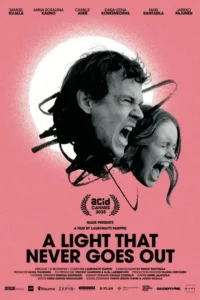Last updated on June 9, 2025
A film by Amélie Bonnin
With: Juliette Armanet, Bastien Bouillon, François Rollin, Tewfik Jallab, Dominique Blanc
Cécile is about to open her own gourmet restaurant, finally making her dream come true, when suddenly her father has a heart attack and she is called back to the village where she was born. Far from the hubbub of Paris life, she runs into her teenage crush. The memories come flooding back, destabilizing her certainties.
Our rate: **
Amélie Bonnin’s short film of the same name, which we discovered at the Clermont-Ferrand festival, had left us rather indifferent—although, to be fair, our opinions didn’t entirely align. So it was a surprise to see Thierry Frémaux and the selection committee choose to include Partir un Jour in the lineup—especially as the opening film, which we did not expect. Another surprise came this evening: it turns out Amélie Bonnin knows how to use the feature-length format to develop her story and its emotional undercurrents, delivering a well-balanced, pleasantly paced romantic comedy. The director fully embraces the genre she’s working in—cheesy romance—and makes it her subject. She also demonstrates a deft hand when incorporating popular songs into the narrative, again with a thoughtful balance. For comparison, Resnais, Bacri, and Jaoui deliberately overused songs in Same Old Song, while Christophe Honoré’s use of Alex Beaupain’s melodies, or Ozon’s 8 Women, sometimes overwhelmed the film’s own narrative. The closest point of equilibrium here would be Demy’s musicals, or perhaps Jeanne and the Perfect Guy by Olivier Ducastel and Jacques Martineau—even though thematically, the film leans more towards the lighthearted tone of Resnais or Honoré, without reaching the overt stylization of Ozon in Sitcom. Bonnin relies on solid directorial ideas and actors who seem deeply committed and convincingly cast—suggesting strong direction. Special mentions go to François Rolin, rarely so believable once freed from his usual comic persona, and Dominique Blanc, excellent as ever, who complement the duo of Bastien Bouillon—sometimes uneven in his performances but here, as in the short film, sincere—and Juliette Armanet, disarmingly natural and pitch-perfect. The film flows smoothly without any major pacing issues, establishing an overall tone of melancholy. Even though the narrative arc—while not entirely clichéd—lacks significant twists beyond the classic inner conflicts and obstacles taught in every screenwriting class. One caveat, however: the film’s perspective on its characters—and on provincial life—felt ambiguous, even contradictory. This romantic comedy will no doubt resonate with neo-Parisians who left their grimy hometowns behind, albeit with a touch of nostalgia. But what about the provincial audience? There’s a certain tenderness toward those who stay rooted in their native soil, but caricature—and the typically Parisian condescension—sneaks in regardless. Armanet’s character clearly embodies Bonnin’s own conviction: that provincial life is for those who have renounced ambition. This is reinforced by the stark contrast she draws between haute cuisine and traditional “truck stop” fare, her insistence on depicting grime and lack of prospects, and her failure to show the internal diversity of the provinces themselves.










Be First to Comment